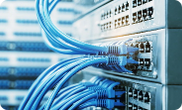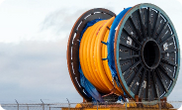El papel de los cables en los centros de datos

El cableado es la columna vertebral de cualquier centro de datos. A medida que el volumen de datos se dispara y la demanda de conectividad de alta velocidad aumenta, elegir el cableado adecuado es crucial.
Un sistema de cableado bien estructurado garantiza fiabilidad y ahorros a largo plazo. Tanto si está instalando un nuevo centro de datos como actualizando uno existente, comprender los tipos de cables y sus usos le ayudará a tomar decisiones informadas.
Esta guía cubre:
-
Consideraciones clave al elegir cables para centros de datos
-
Las diferencias entre los cables de datos de fibra óptica y de cobre
-
Tipos de cables de alimentación y cables de datos utilizados en los centros de datos modernos
¿Qué es un centro de datos?
Un centro de datos es una instalación especializada que alberga infraestructura informática para almacenar y procesar grandes cantidades de información digital. Consta de servidores, equipos de red, sistemas de almacenamiento e infraestructura de cableado, todos ellos trabajando en conjunto para respaldar operaciones críticas de TI.
Tipos de centros de datos:
-
Centros de datos empresariales : propiedad privada de empresas para uso interno.
-
Centros de datos de coubicación : instalaciones que alquilan espacio e infraestructura a empresas.
-
Centros de datos de servicios gestionados : instalaciones subcontratadas administradas por proveedores externos.
-
Centros de datos en la nube : infraestructura virtualizada y distribuida para la computación en la nube.
-
Centros de datos de hiperescala : operaciones a gran escala para empresas como Amazon, Google y Microsoft, optimizadas para el procesamiento de datos de gran volumen y la escalabilidad de la nube.
-
Centros de datos de borde : instalaciones pequeñas y descentralizadas más cercanas a los usuarios finales para reducir la latencia y mejorar la entrega de contenido
-
Centros de datos de IA : diseñados para cargas de trabajo de inteligencia artificial y aprendizaje automático, que requieren redes de alta velocidad, clústeres de GPU y sistemas de refrigeración avanzados.
-
Microcentros de datos : centros de datos compactos y modulares utilizados para informática localizada, IoT y automatización industrial.
Cables de datos de cobre vs. fibra óptica en centros de datos
Los cables de cobre en los centros de datos se utilizan no solo para la alimentación, sino también para la transmisión de datos. Tanto los cables de datos de cobre como los de fibra óptica cumplen funciones distintas en el soporte de la infraestructura del centro de datos, cada uno con funciones específicas. Así es como transmiten los datos:
-
Los cables de fibra óptica se utilizan para conexiones troncales de alta velocidad y larga distancia de hasta 40 km. Ofrecen un gran ancho de banda, mínima pérdida de señal y son ideales para la transmisión de datos a alta velocidad, pero su coste es mayor.
-
Los cables de datos de cobre, como los cables Cat y Twinaxial, son ideales para conexiones cortas y de alta velocidad entre servidores y conmutadores en un radio de 10 metros. Son rentables, energéticamente eficientes y fáciles de instalar, lo que los hace ideales para el cableado estructurado dentro de racks de servidores.
La mayoría de los centros de datos utilizan ambos: fibra óptica para enlaces troncales de alta velocidad y cables de datos de cobre para conexiones de rack eficientes y rentables.
Consideraciones clave para el cableado del centro de datos
Vida útil y escalabilidad de la red
-
Elija cables que admitan futuras demandas de ancho de banda, como Ethernet 10G, 40G y 100G.
-
Invierta en sistemas de cableado estructurado con paneles de conexión modulares para facilitar las actualizaciones.
Eficiencia energética y consumo de energía
-
El cableado de alta densidad reduce los costos de enfriamiento y mejora el flujo de aire.
-
Los cables de cobre consumen menos energía que la fibra óptica en aplicaciones de corta distancia.
Integridad y confiabilidad de la señal
-
Los cables blindados evitan interferencias electromagnéticas en entornos de alta densidad.
-
Una conexión a tierra adecuada con cables G-GC garantiza una distribución de energía estable.
Consideraciones de costos y presupuesto
-
La fibra óptica ofrece un alto rendimiento pero es cara
-
Los cables de cobre son rentables y ofrecen confiabilidad para conexiones de corta distancia.
Cables de alimentación utilizados en centros de datos
Comprensión de los cables de alimentación en los centros de datos
Los cables de alimentación son fundamentales para distribuir la electricidad hacia y a través de un centro de datos. Los centros de datos utilizan diferentes tipos de cables de alimentación según los requisitos de voltaje y las condiciones ambientales. A continuación, se presentan algunos de los cables de alimentación más comunes que se utilizan en los centros de datos modernos.
Tipos de cables de alimentación utilizados en centros de datos
Cables de bandeja (TC, TC-ER, ITC, PLTC)
Los cables de bandeja están diseñados para la distribución de energía estructurada en sistemas de bandejas portacables. Estos cables se encuentran a menudo en centros de datos de gran escala, donde la gestión eficiente de múltiples líneas eléctricas es una prioridad.
Cables EPR/PVC
Los cables MV-105 de EPR (caucho de etileno propileno)/PVC (cloruro de polivinilo) son cables de alta tensión diseñados para resistir la humedad y las sustancias químicas. Se utilizan comúnmente en áreas expuestas a sistemas de climatización (HVAC), unidades de refrigeración y en exteriores.
Cables SOOW
Los cables SOOW (resistentes al aceite de servicio y a la intemperie) son cables de alimentación flexibles y de alta resistencia que se utilizan en aplicaciones de energía portátil. En centros de datos, son ideales para instalaciones de energía temporales, generadores de energía de respaldo y situaciones de mantenimiento de emergencia.
Cables THHN/THWN
Los cables THHN (nailon termoplástico de alta resistencia al calor) y THWN (nailon termoplástico resistente al calor y al agua) se utilizan ampliamente para el cableado general de edificios dentro de centros de datos. Estos cables se utilizan comúnmente en circuitos derivados, instalaciones de conductos y cableado de paneles para distribuir la energía en toda la instalación.
Cables MC (revestidos de metal)
Los cables MC (revestidos de metal) son cables blindados que ofrecen protección mecánica y resistencia al fuego. Se utilizan comúnmente en infraestructuras críticas, garantizando que la energía se dirija de forma segura a los racks de servidores y a los sistemas de energía de emergencia.
Cables XHHW-2
Los cables XHHW-2 (reticulados, resistentes al calor y al agua) se utilizan en sistemas de distribución eléctrica de alta tensión. Estos cables se utilizan en alimentaciones primarias, sistemas de energía redundantes y generadores de respaldo en centros de datos.
Cables de alimentación de CC
Los cables de alimentación de CC se utilizan en configuraciones de distribución de energía de corriente continua (CC), como sistemas de respaldo de batería (UPS) y redes eléctricas de alta eficiencia.
Cables EPR/XLPE
Los cables EPR/XLPE (polietileno reticulado) están diseñados para aplicaciones de alto voltaje, como la distribución de energía desde transformadores y generadores hasta equipos de centros de datos.
Cables tipo W
Los cables tipo W son cables de alimentación flexibles y de alta resistencia que se utilizan en aplicaciones de alimentación temporales o móviles.
Tabla de cables de alimentación para centros de datos

Cables de datos de alta velocidad utilizados en centros de datos modernos
Los cables de datos en los centros de datos facilitan la comunicación entre servidores, conmutadores y sistemas de almacenamiento, garantizando una transmisión de datos eficiente y un buen rendimiento de la red. A continuación, se detallan los diferentes cables de datos utilizados en los centros de datos:

Nassau National Cable ofrece una gama completa de cables de fibra óptica y cobre para satisfacer las necesidades de cualquier centro de datos.


















